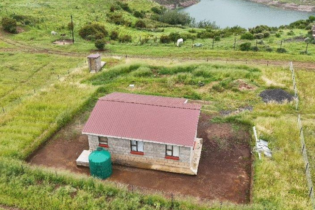The first phase of the R23.4-billion new multi-product pipeline project between Durban and Gauteng will be completed within budget by December next year, a revised date following significant cost and time overruns.
The project – one of South Africa’s biggest infrastructure jobs, employing more than 12000 people – involves the laying of a 555km pipeline to transport diesel, jet fuel and petrol from Durban to Gauteng. The pipeline already supplies 40% of Gauteng’s fuel, expected to rise to 65% in five years. Public Enterprises Minister Malusi Gigaba late last week marked the start of the last stage of phase 1 – the building of a terminal at Island View, inside the Port of Durban – with the release of a special review of the cost and schedule variations that dogged the early part of the project. In 2006, phase 1 of the project was estimated to cost R9.5-billion but the cost tally is now at R23.4-billion. There are further phases in the years ahead as demand for fuel rises in Gauteng. The pipeline has, at half its capacity, already moved 2.2-billion litres of diesel since January, equal to 200 trucks a day transporting fuel over the period. Gigaba said the pipeline had faced challenges in its early stages, including lack of capacity and in-house expertise, which led to an over-reliance on contractors, an overly ambitious timeline and an underestimated budget. The review found that a decision to dispense with the main engineering and construction management contractor at the end of the initial design stage, had added to costs and the delays.The time taken to assign a new contractor, failure to implement a design freeze after initial design approval, changes to the terminal design, unsatisfactory safety performance, poor environmental compliance, inadequate reporting, and poor controls and supervision were among the other factors that had added to costs and delays.
Gigaba said the government had learned lessons from the project, and he had established a capital projects unit in his office to oversee all capital projects. It was important that the government maintained investment in new capacity and maintenance, so that it was not again faced with having to invest in projects due to capacity constraints on the economy, he said. Project director Theunis Steenkamp said persistent rains in Durban resulted in delays of the equivalent of 41 work shifts since August 1 because it was not possible to weld in rain. He said some night shifts, and Saturday and Sunday shifts, had been introduced to catch up. Transnet Capital Projects group executive Charl Moller said he expected the cost of the new pipeline to raise the cost of a litre of fuel by up to 32c a litre, and an average of 25c a litre over the longer term. Moller said this was low considering that the pipeline was expected to last 75 years and the current transport cost of fuel was 22c of a total petrol price of about R12 a litre. http://www.timeslive.co.za/thetimes/2012/12/03/pipeline-running-on-budget





